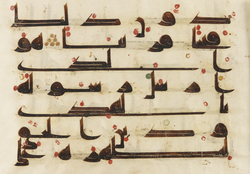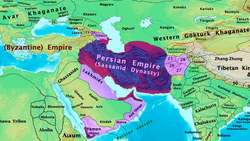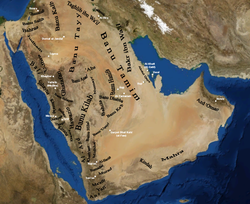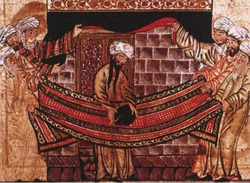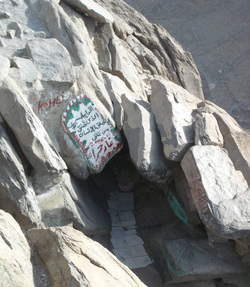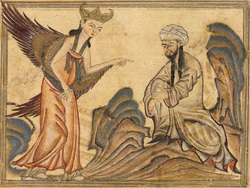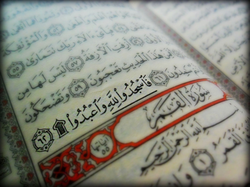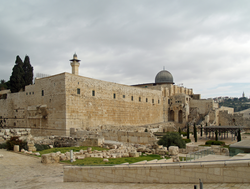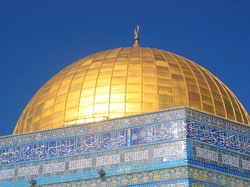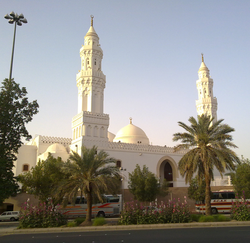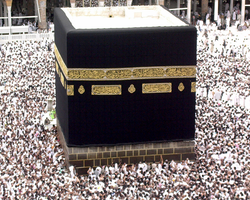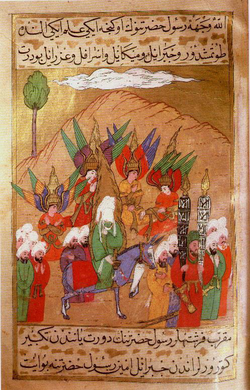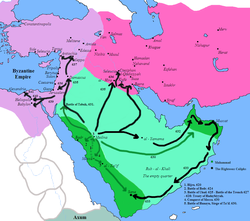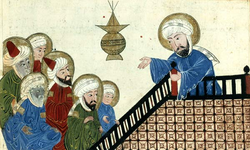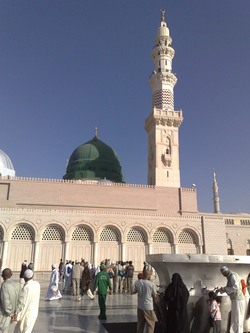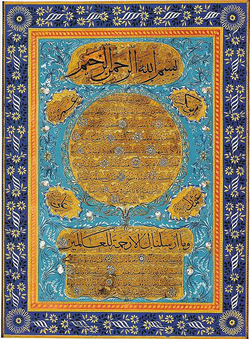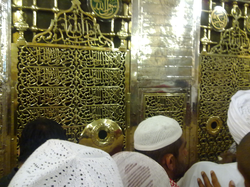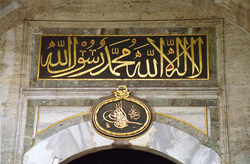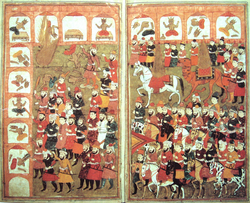Muhammad
Muhammad
Muhammad (Arabic : محمد ; pronounced [muħammad]; French : Mahomet /məˈhɒmɪt/; latinized as Mahometus c. 570 CE – 8 June 632 CE) is the prophet and founder of Islam. [666666] [2] According to Islamic doctrine, he was God's Messenger, sent to confirm the essential teachings of monotheism preached previously by Adam, Abraham, Moses, Jesus, and other prophets. [2] He is viewed as the final prophet of God in all the main branches of Islam, though some modern denominations diverge from this belief. [118] Muhammad united Arabia into a single Muslim polity and his teachings, practices, and the Quran form the basis of Islamic religious belief.
Born approximately 570 CE (Year of the Elephant) in the Arabian city of Mecca, Muhammad was orphaned at an early age; he was raised under the care of his paternal uncle Abu Talib. Periodically, he would seclude himself in a mountain cave named Hira for several nights of prayer; later, at age 40, he reported being visited by Gabriel in the cave, [73] where he stated he received his first revelation from God. Three years later, in 610, Muhammad started preaching these revelations publicly, proclaiming that "God is One", that complete "surrender" (lit. islām ) to him is the right course of action (dīn ), [117] and that he was a prophet and messenger of God, similar to the other prophets in Islam.
Muhammad gained few early followers, and met hostility from some Meccans. To escape persecution, Muhammad sent some followers to Abyssinia before he and his followers migrated from Mecca to Medina (then known as Yathrib) in the year 622. This event, the Hijra, marks the beginning of the Islamic calendar, also known as the Hijri Calendar. In Medina, Muhammad united the tribes under the Constitution of Medina. In December 629, after eight years of intermittent wars with Meccan tribes, Muhammad gathered an army of 10,000 Muslim converts and marched on the city of Mecca. The conquest went largely uncontested and Muhammad seized the city with little bloodshed. In 632, a few months after returning from the Farewell Pilgrimage, he fell ill and died. Before his death, most of the Arabian Peninsula had converted to Islam.
The revelations (each known as Ayah , lit. "Sign [of God]"), which Muhammad reported receiving until his death, form the verses of the Quran, regarded by Muslims as the "Word of God" and around which the religion is based. Besides the Quran, Muhammad's teachings and practices (sunnah ), found in the Hadith and sira literature, are also upheld by Muslims and used as sources of Islamic law (see Sharia).
| Islamic prophetMuhammadمُحَمَّد | |
|---|---|
| Born | Muḥammad ibn ʿAbdullāh(Arabic:مُحَمَّد بِن عَبد الله)c. 570 |
| Died | 8 June 632 (aged c. 62) |
| Resting place | Green Domeatal-Masjid an-Nabawi, Medina(present-day Saudi Arabia) |
| Other names |
|
| Years active | 583–609 CE as merchant609–632 CE as religious leader |
| Notable work | Constitution of Medina |
| Successor | Succession to Muhammad |
| Spouse(s) | |
| Children | Children |
| Parent(s) | Abdullah ibn Abdul-Muttalibsmaller |
| Relatives | Family tree of Muhammad,Ahl al-Bayt("Family of the House") |
‹ Thetemplatebelow (Infobox Arabic name) is being considered for merging.Seetemplates for discussionto help reach a consensus.› | |
| Personal (Ism) | Muhammad |
| Patronymic (Nasab) | Muḥammad ibn'Abd Allahibn 'Abdul-MuttalibibnHashimibn'Abd ManafibnQusaiibnKilab |
| Teknonymic (Kunya) | Abual-Qasim |
| Epithet (Laqab) | Khātim an-Nâbîyīn |
| Signature | |
| Seal of Muhammad | |
Names and appellations in the Quran
The name Muhammad ( /mʊˈhæməd, -ˈhɑːməd/ ) [111] means "praiseworthy" and appears four times in the Quran. The Quran addresses Muhammad (P.B.U.H - Peace Be Upon Him) in the second person by various appellations; prophet, messenger, servant of God ('abd), announcer (bashirQuran ] witness ( Quran ] bearer of good tidings ( mubashshir), warner (*nathirQuran ] reminder ( mudhakkirQuran ] one who calls [unto God] ( Quran ] light personified ( noorQuran ] and the light-giving lamp ( siraj munirQuran ] Muhammad is sometimes addressed by designations deriving from his state at the time of the address: thus he is referred to as the enwrapped ( ) in Quran and the shrouded ( al-muddaththir Seal of the Prophets", or the last of the prophets. The Quran also refers to Muhammad as *"more praiseworthy" (Arabic : أحمد , Sura As-Saff).

